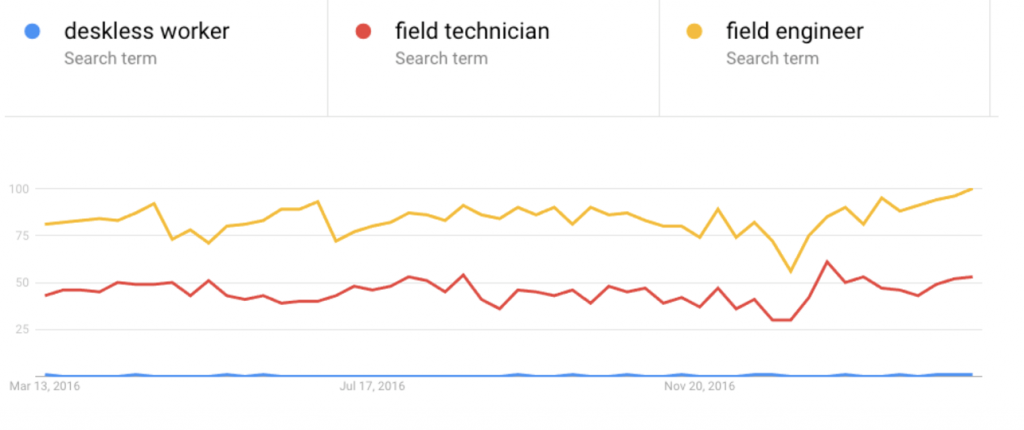14 Mar The Deskless Worker is Not a Field Tech


The advent of the deskless worker comes at a time when workplaces, technologies and the economics of productivity are at their most flexible. The notions of “going to work” and “working hours” have been fully redefined to the point where we have best-selling books with titles like Work Without Walls, The Future Workplace Experience and The End of Jobs. During the industrial age, the argument goes, work happened within the factory and the office. In the Information Age, work happens everywhere.
The deskless worker seems very much like a new concept. In fact, it is not. The deskless worker is an old concept; its definition has simply been refined. In the past year, the phrase has come to denote an individual who does much of their professional work with a mobile device instead of a laptop computer and who is often on the go. This describes just about everyone in corporate America. So how does a deskless worker differ from a field tech? Is deskless worker synonymous with oil pipeline inspector? Cell tower installer? Utility engineer? Aircraft maintenance technician? No. These are radically different jobs.
To shed more light on what deskless worker actually means, it’s useful to break down the persona into its constituent parts and compare them to those of a field service professional.
| Deskless Worker | Field Service Worker | |
|
|
||
| Skillset | Generalist trained to perform any number of roles within a service industry. | Specialist trained in technical or industrial roles that often require certification or licensure. |
|
|
||
| Representative Industries | Retail, restaurants, hospitality, security | Energy, telecom, utilities, manufacturing, technology, aerospace, construction services, healthcare, transportation |
|
|
||
| Contribution to Business | Actions are widely varied, mainly having an impact on the productivity of colleagues and the allocation of resources. | Actions have a direct impact on company revenues, profitability and customer satisfaction. |
|
|
||
| Systems Interactions | Depends on project management and collaboration tools, often consumer-grade, that enable communication, production and analysis, such as chat, file sharing, video conferencing and asset repositories (e.g., Google Drive). | Depends on enterprise applications that enable decisions and action, such as CRM, ERP, service platforms, knowledge management systems, and asset databases. |
|
|
||
| Mobile Needs | Consumer-oriented apps that provide access to people and files. Apps often enable business resources to be produced or consumed. | Specialized, task-oriented apps that mold to business workflows and provide access to enterprise systems and knowledge-based content. Apps often enable customer-centric processes and trigger actions that tie to revenue cycle and discrete KPIs. |
|
|
||
A more analytical look at the deskless worker shows that there’s a relatively low volume of interest in the concept, giving credence to its lack of specificity. Searches on Google during the past year for “deskless worker” are dwarfed by “field technician” and even more so by “field engineer.”

While the deskless worker is a real concept, it’s a broad category and is easily distinguished from a field service worker. Both of these types of professionals are mobile and may rarely sit behind a desk, but that’s where the similarities end.
Interested in fully mobile enabling your field technicians? Read our Mobile Field Service Apps Guide.



